The extended border closures at Moreh, near the India-Myanmar border in Manipur, have resulted in the loss of business for the approximately 200 shops tightly packed around the integrated check post on the Indian side.
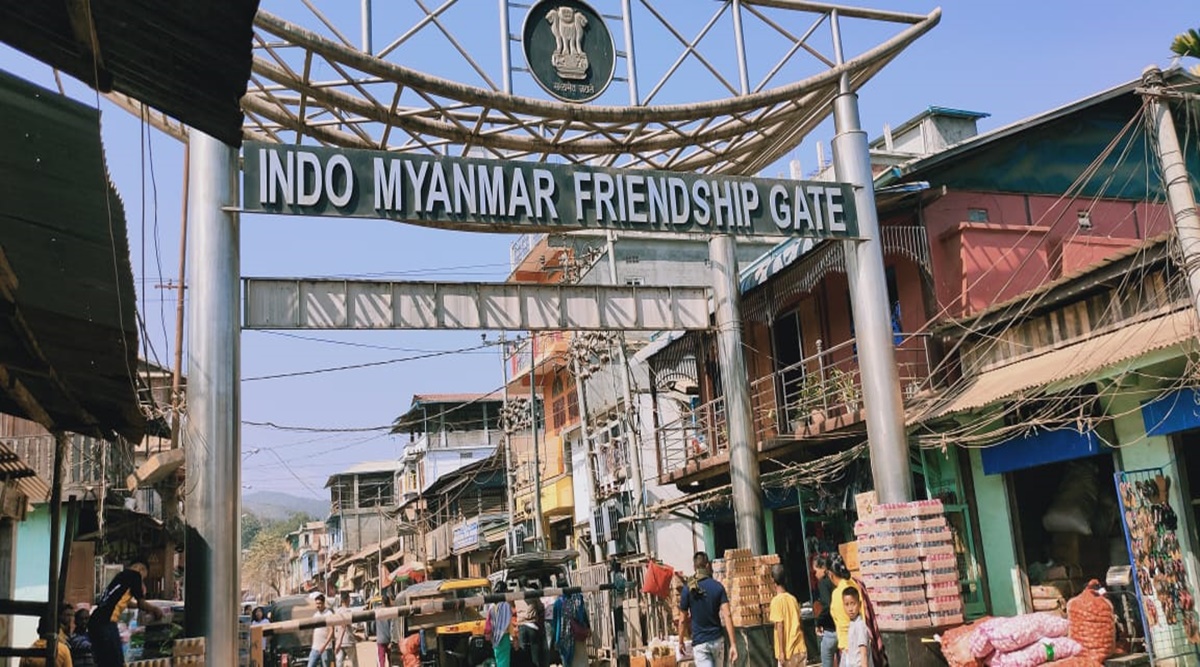
Moreh is an important international border crossing and a major trade route that connects South Asia, Southeast Asia and ASEAN economies. (Photo credit: Sonboi)
Mohammad Faizal’s voice cracks with emotion as he begins to narrate his ordeal. Since March last year, after the coronavirus outbreak led to a nationwide shutdown in India, the 48-year-old who runs a grocery shop in Moreh, the last Indian town before the international border between India and Myanmar, has struggled to make ends meet.
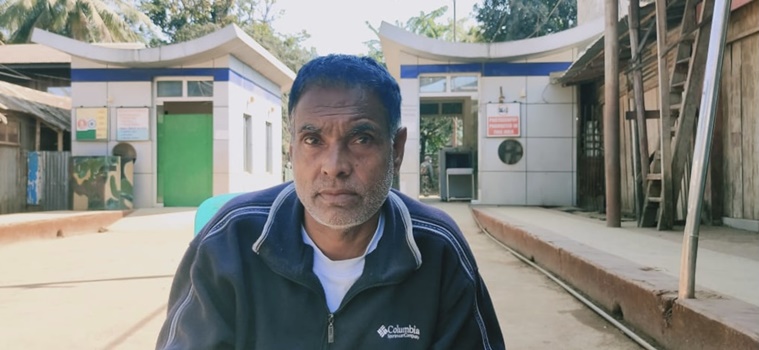 Mohammad Faizal sits outside his grocery shop located close to the
India-Myanmar border. The integrated check post on Indian territory is
visible behind him. (Photo credit: Sonboi)
Mohammad Faizal sits outside his grocery shop located close to the
India-Myanmar border. The integrated check post on Indian territory is
visible behind him. (Photo credit: Sonboi)
Just when Faizal had expected his financial troubles to ease, with the proposed start of cross-border trade on February 1, Myanmar’s military seized power on that very day, in a coup against the democratically elected government of Nobel laureate Aung San Suu Kyi. In early morning raids, Suu Kyi was detained along with other leaders of her party. The international border gates at Moreh that were scheduled to open on that day, remained closed.
In his small grocery shop that almost abuts the integrated check post at the Indo-Myanmar border, Faizal sells everything from milk and rice to vegetables and dried betel nuts. In the 20 years that he has run his little business, he has never seen a situation this dire. “Don’t even ask about what I am going through. Earlier I would earn Rs. 600 per day; now I am earning almost nothing. I am eating using my savings,” he says.
It is his three children for whom Faizal is most concerned. “For the past eight to nine months, I have only been feeding them dal and water.”
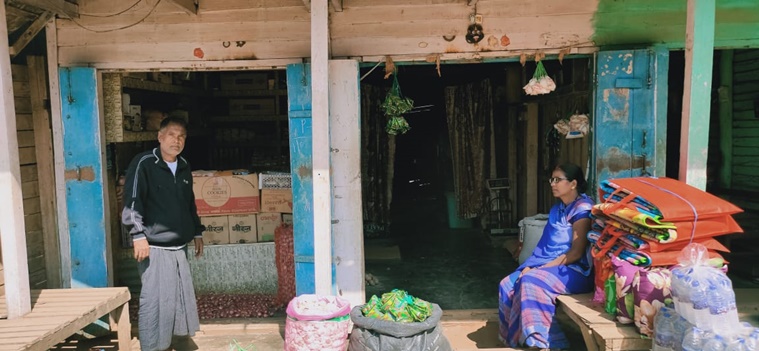 Mohammad Faizal stands inside his grocery shop located close to the
India-Myanmar border in Moreh, near the integrated check post on Indian
territory. His wife Ibema sits nearby, waiting for customers. (Photo
credit: Sonboi)
Mohammad Faizal stands inside his grocery shop located close to the
India-Myanmar border in Moreh, near the integrated check post on Indian
territory. His wife Ibema sits nearby, waiting for customers. (Photo
credit: Sonboi)
The extended border closures have resulted in the loss of business for the approximately 200 shops tightly packed around the integrated check post on the Indian side. According to these shopkeepers, after the Indian government lifted several public health restrictions last year, business had just started getting back on its feet. Then, the coup in Myanmar brought everything to a screeching halt.
Moreh is an important international border crossing and a major trade route that connects South Asia, Southeast Asia and ASEAN economies. In the region, Myanmar is an important trade partner and it is also the only ASEAN country with whom India shares both a land and a maritime boundary. Although seasonal agriculture provides income for some residents, it is the international trade, a significant part of which is illegal, that sustains Moreh’s local economy, according to a 2016 report by India’s Ministry of Commerce and Industry.
“Historically, unregulated trade has always existed between Manipur and Myanmar through this border,” explains Dr Arambam Noni, Assistant Professor, Department of Political Science, DM College of Arts, Imphal. According to the 2016 report, border trade between India and Myanmar stands at approximately $50 million, up from about $15 million in 2005-2006.
Bilateral trade between Indian and Myanmar is supported by New
Delhi’s 2010 free trade agreement with AESEAN nations. The trade of 62
designated items are at present allowed after the agreement was updated
in 2012.
Although official trade routes were closed following the coronavirus outbreak in March last year, unregulated and illegal trade on a smaller scale continued between Moreh and Tamu, the first border town in Myanmar’s territory, till the coup occurred.
“Mostly only illegal trade happens along the India-Myanmar border. The official trade is negligible in comparison,” says a source familiar with the operations, requesting anonymity.
S. Saikhom has been running an electronics store in Moreh near the integrated check post for some 15 years now, and would regularly travel back and forth between India and Myanmar buying and selling products before the gates closed. Everything has changed for small traders and shop owners like him. “Things have become very expensive. Costs have increased and there is a ban on transporting goods. The customers are not coming,” he says.
In Moreh, the Indo-Myanmar Friendship Gate provides two points for entry into Myanmar, Gate 1 and Gate 2, where the latter serves as the informal entrance most frequently used by small traders and daily-wage earners crossing the border every day. For 16 kilometers on either side of the border, free movement without passports is permitted by both the Indian and the Myanmar governments.
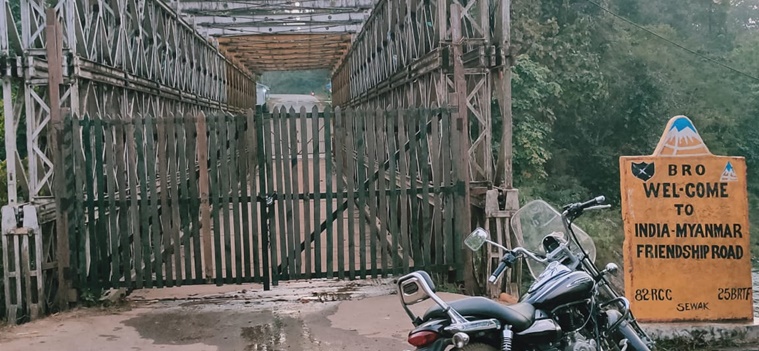 Gate 1 of the Indo-Myanmar Friendship Gate in Moreh, Manipur. At the
other end of the bridge is Myanmarese territory. (Photo credit: Sonboi)
Gate 1 of the Indo-Myanmar Friendship Gate in Moreh, Manipur. At the
other end of the bridge is Myanmarese territory. (Photo credit: Sonboi)
However, transporting medium to large sized items across the border has never been easy, the shopkeepers say, as border guards would stop them citing regulations. Now with Myanmar completely sealing its border, movement has become impossible. “On some days, (Indian) security forces would let us take one or two medium to large-sized goods across to Myanmar and on other days they wouldn’t. What can we do?” asks one shopkeeper in Moreh. “I am having a hard time paying my staff salaries but I still have to, because otherwise how will they eat?”
But sources familiar with the operations at the border dismiss these claims. “They don’t pay any taxes or customs duty. In the (free-trade) agreement, there are provisions only for items that can be carried on the head, but they try to pass everything through the borders,” the source says.
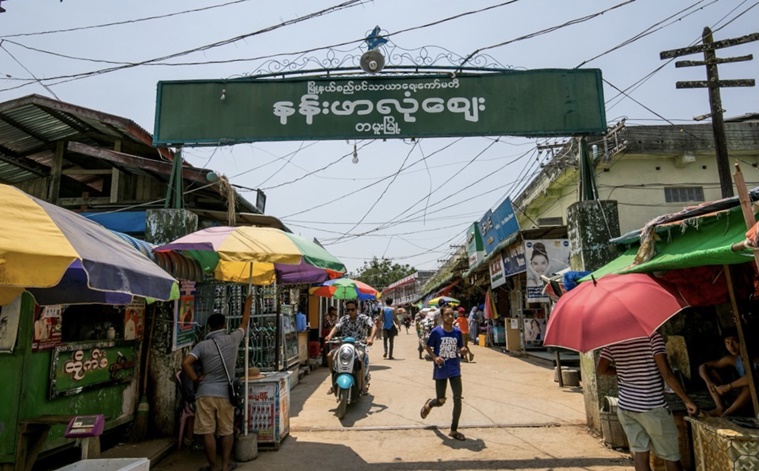 Namphalong market in Myanmar’s territory, is a five-minute rickshaw
ride from the integrated check post. Immediately upon entering the
marketplace, the signboard in green reads ‘Namphalong market, Tamu’ in
Burmese. In this file photo from 2019, the marketplace appears to be
visibly busy. Local shopkeepers attest that the scenario has changed
since March 2020, with no Indian customers and only a handful of local
shopkeepers. (Photo credit: Assad Dadan)
Namphalong market in Myanmar’s territory, is a five-minute rickshaw
ride from the integrated check post. Immediately upon entering the
marketplace, the signboard in green reads ‘Namphalong market, Tamu’ in
Burmese. In this file photo from 2019, the marketplace appears to be
visibly busy. Local shopkeepers attest that the scenario has changed
since March 2020, with no Indian customers and only a handful of local
shopkeepers. (Photo credit: Assad Dadan)
The scenario isn’t very different across the border in Myanmar. A five-minute rickshaw ride from the integrated check post in Myanmar’s territory is Namphalong market, which at first glance appears to be almost an extension of the marketplace in Moreh. Tamu, the nearest border town, is another 3 kilometers down the road.
While vendors selling everyday essentials like fruits, vegetables and grains have returned to the marketplace in a trickle over the past few months, it has been harder for shopkeepers like 27-year-old Khin Maung Myint (name changed upon request). “Namphalong market is open but the Indians are not coming,” he says during a phone interview, requesting anonymity. Shopkeepers like him are entirely reliant on customers from across the border, he says. “I have not opened my electronics shop in almost one year. What can I say?”
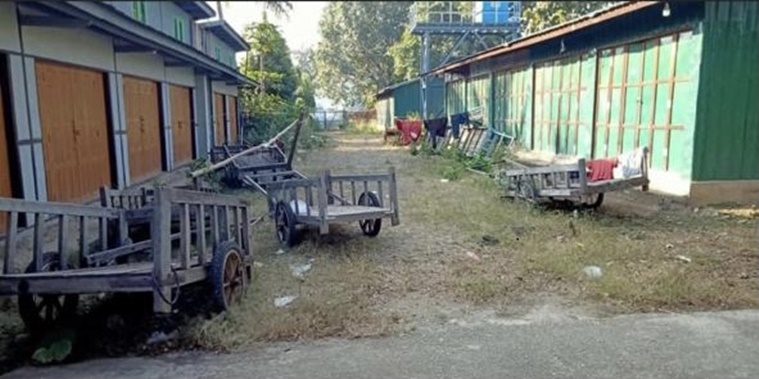 The empty marketplace in Namphalong. Shutters have been down since
March 2020 and shopkeepers have stayed away, mostly because there are no
customers from India. This photo was taken a few days ago but the
source was unable to confirm whether it was taken following the coup or
prior to it. Photo credit: Khin Maung Myint (name changed upon request)
The empty marketplace in Namphalong. Shutters have been down since
March 2020 and shopkeepers have stayed away, mostly because there are no
customers from India. This photo was taken a few days ago but the
source was unable to confirm whether it was taken following the coup or
prior to it. Photo credit: Khin Maung Myint (name changed upon request)
Namphalong market is a cluster of permanent and semi-permanent structures where locals set up shop every day. Each unit is not larger than 3×4 feet in width. “Goods are being sold across the border in India using illegal routes and I am just about managing to run my household through the income I earn from these kinds of sales,” admits Khin Maung Myint. He doesn’t have a choice, he says; he has two parents, a wife and two small children to look after.
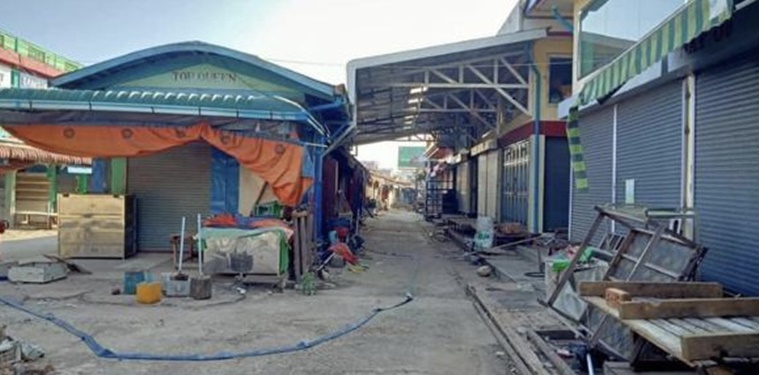 The empty marketplace in Namphalong, where shutters have been down
since March 2020. This photo was taken a few days ago but the source was
unable to confirm whether it was taken following the coup or prior to
it. Photo credit: Khin Maung Myint (name changed upon request)
The empty marketplace in Namphalong, where shutters have been down
since March 2020. This photo was taken a few days ago but the source was
unable to confirm whether it was taken following the coup or prior to
it. Photo credit: Khin Maung Myint (name changed upon request)
“My friends who have garment shops in Namphalong have nothing to eat,” says Khin Maung Myint. Although the Myanmar government has been distributing rice to residents in the area, it isn’t enough, he explains.
Over the past year, his friends were forced to find alternate sources of income that come with their own set of dangers. “In the dead of the night, they smuggle clothes, cosmetics, things like that, across the border in India. They are paid Rs. 250 to coolie—smuggle—these goods across,” he says of the porous borders between the two countries.
This “coolie work” is illegal, dangerous and difficult, but Myanmarese nationals living near the border here say they have little choice. “Coolie work starts at 11 p.m. and goes on till 4 a.m.,” he says. They fear getting caught by border forces, but they continue engaging in this kind of work.
Officials familiar with smuggling and illegal trade operations at the Indo-Myanmar border, requesting anonymity, told indianexpress.com that despite the closure of the gates at Moreh and Tamu, illegal trade has continued along the more porous sections of the borders between the two countries. Security forces cannot be deployed for patrolling at all points along the border, especially at night, and there are always people on both sides of the border who manage to evade checks and border guards.
 Significant sections of the Indo-Myanmar border are porous, that allow
people to pass through to the other side relatively easily, especially
in the darkness of the night. In this photograph, Myanmarese territory
lies on the other side of the barbed wire fence in Moreh, Manipur.
(Photo credit: Sonboi)
Significant sections of the Indo-Myanmar border are porous, that allow
people to pass through to the other side relatively easily, especially
in the darkness of the night. In this photograph, Myanmarese territory
lies on the other side of the barbed wire fence in Moreh, Manipur.
(Photo credit: Sonboi)
Community leaders on both sides of the border have urged their respective governments for assistance, says Dr. Noni, but little has changed. “Livelihood (for locals) hasn’t been secured and now the coup has added more uncertainty. The Indian embassy in Myanmar has asked Indian citizens to avoid unnecessary travel and it appears that it will take time for the border to reopen.”
Security forces intensified vigil earlier this week along the 398 km-long Indo-Myanmar border in Manipur, following the coup in Myanmar. “The impact of the coup is yet to be felt in the border areas in India, but national security is of course a concern. It will be in national interest if trade is completely stopped for a while. (Locals on both sides of the border) have to understand the difference between illegal and legal trade,” the source says.
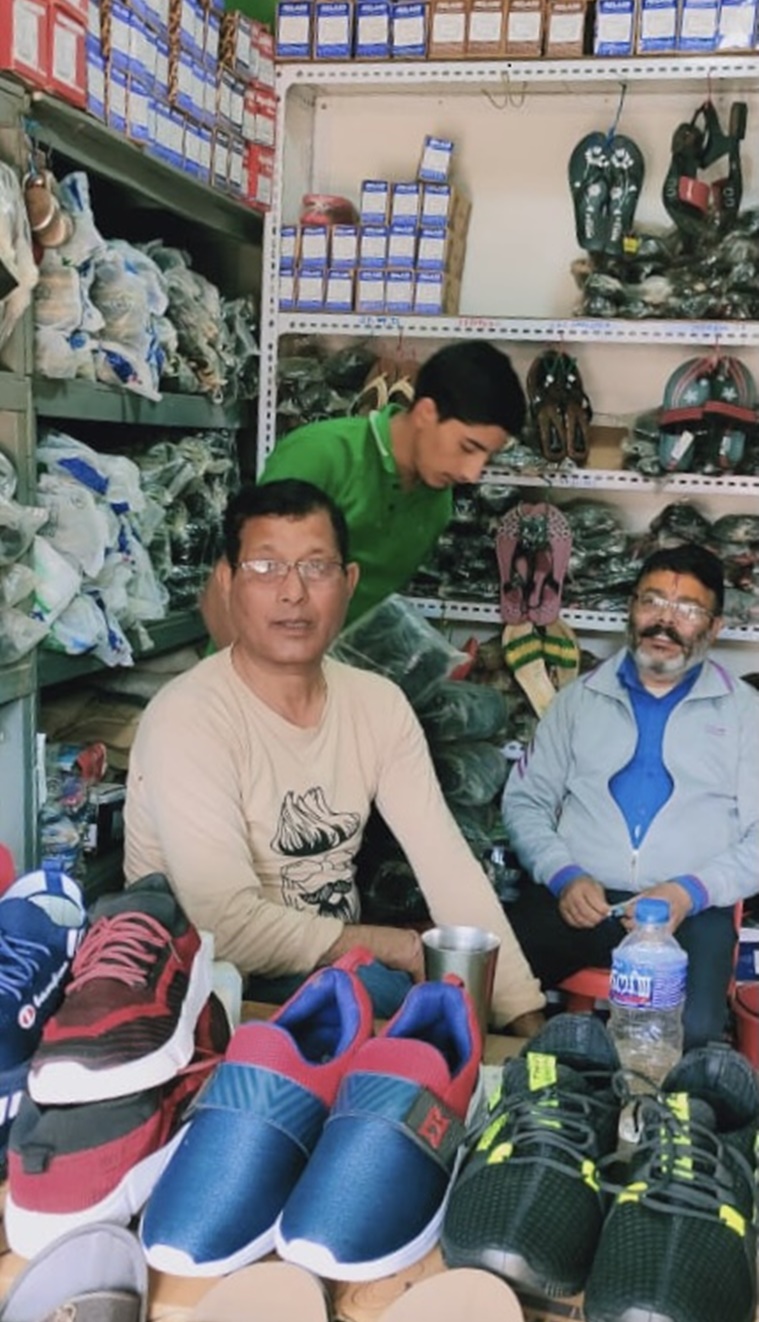 P.T. Adhikari sits surrounded by shoes and sandals in different colours
and styles in his shop located close to the India-Myanmar border in
Moreh, near the integrated check post on Indian territory. (Photo
credit: Sonboi)
P.T. Adhikari sits surrounded by shoes and sandals in different colours
and styles in his shop located close to the India-Myanmar border in
Moreh, near the integrated check post on Indian territory. (Photo
credit: Sonboi)
Unlike other shop owners around him, 60-year-old P. T. Adhikari sits surrounded by shoes and sandals in different colours and styles, and is less concerned about the closure of the borders and its impact on cross-border unregulated trade. “I’m not worried. I’ll see what happens,” he says.
A few doors down, despite his everyday worries, Mohammad Faizal is hopeful. “Myanmar will solve its problem in one month.” Long-term observers of Myanmar aren’t as certain that it will. But if and when the border gates open, it is not clear whether it will be business as usual for shopkeepers like Faizal, or whether the people of Moreh will see a different Myanmar.







2 comments:
Because we've Best Choices and Real Genuine Model Girls and Ladies. We are Provide Complete Satisfaction No Attitude and No Any sort of Nakhra. Smooth and Friendly Behaviour, Frank Atmosphere For Your Enjoyment in Gurgaon Escorts. We've All Facilities In Call and Out Call Both are Services Available. If you would like With Five Star Hotel and Hi Profile Models then Contact Me Fast.
buy kids jeans online: buy new collection of jeans online for kids in a variety of colours & Design at low offer price & discounts at COD, Easy Returns & Exchanges. Order Now.
Post a Comment